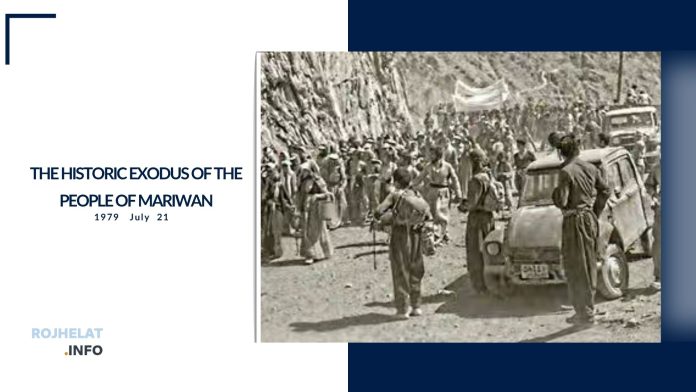In the tumultuous history of Eastern Kurdistan (Rojhelat), there have been moments when human dignity and collective will have risen from the depths of oppression and bloodshed. One of the brightest of these moments was undoubtedly the historic mass exodus of the people of Mariwan in July 1979. This event was a civil reaction to military threats and one of the loudest collective cries of protest against tyranny and militarism. It is firmly etched in the collective memory of the nation.
In the summer of 1979, the newly established Islamic Republic sent Revolutionary Guard forces, committees, and armed affiliates to occupy Mariwan, threatening its people with massacre. The citizens of Mariwan then made a historic decision. In an unprecedented move, they declared that if the oppressive forces did not withdraw, they would leave the city as a form of protest.
This threat did not stem from weakness but from a place of dignity and collective awareness. On July 21 and 22, 1979, the people of Mariwan left their homes in orderly groups and moved toward the plains and surrounding villages, especially “Kani Miran.” The silent yet powerful image of a city emptied in protest emerged.
The Mariwan exodus was not merely a political action but also a symbol of the masses’ organisation, solidarity, and political maturity. Unarmed and without media support, and under constant threat of repression, the people took the initiative away from the government and forced it to respond. They proved that resistance is possible even in the face of bullets and bayonets through unity, movement, and collective action.
This exodus altered the fate of Mariwan’s people and the course of Kurdistan’s history. Everyone played a role in this movement, from women and children to the elderly and youth. Each step they took was a step toward preserving dignity, humanity, and freedom. Many women took on responsibilities such as providing food and healthcare, caring for children, and coordinating efforts, demonstrating that they are the backbone of popular resistance in times of crisis.
When fear, oppression, and intimidation ruled the cities, Mariwan’s mass departure set an example for other parts of Kurdistan. It was a model of unarmed yet powerful resistance and a form of protest where human life was paramount and voices of dissent could not be silenced.
The historic Mariwan exodus is a testament to the irreplaceable role of the people in shaping history. It proves that real power lies in the coordinated will of the people. This movement is part of the Kurdish nation’s ongoing struggle for dignity, rights, justice, and freedom. Its echoes are still heard in the slogans of newer generations, including the nationwide “Jin, Jiyan Azadî” (Women, Life, Freedom) movement.
In a world where many movements fall victim to violence, division, or passivity, the Mariwan exodus remains a rare and brilliant example of creative, grassroots, historical resistance. The city emptied, yet its powerful voice lives on in history. Mariwan’s protest march was not just a demonstration; it was an expression of a collective will that raised a voice of peace and human dignity in the face of humiliation, discrimination, and repression. This event is a shining example in the historical memory of the people of Kurdistan and Iran of the power of unarmed people against a heavily armed regime.


